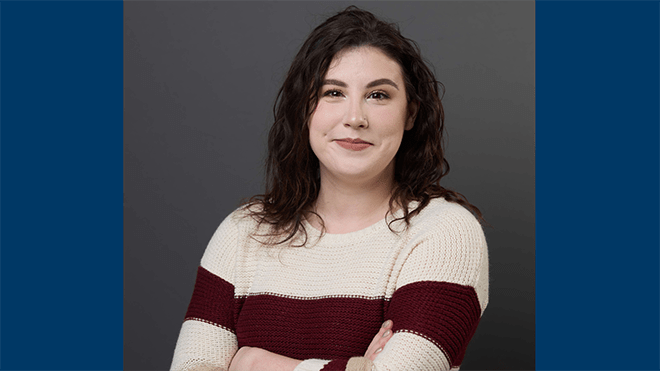Psychology Graduate Publishes Research on Countering Far-Right Content On Social Media
Sarah Burnham M’19 has published a trailblazing paper in the academic journal Human Development.

BRISTOL, R.I. – Sarah Burnham M’19 wants to make sure the kids are all right – by educating them on how to identify when online content is coming from the ideologies of the alt-right.
In a new paper, titled "Social Media Literacy to Confront Far-Right Content: Saying ‘No’ to Neutrality,” published in the academic journal Human Development, Burnham and co-author Mimi Arbeit, Assistant Professor of Psychology at Suffolk University, critique current digital media literacy theories “for their political neutrality or lack of active opposition” and propose an anti-oppressive framework for social media literacy in the pursuit of social justice.
“I’m excited. Human Development is a journal where people want to be published. It’s a big deal in my network,” said Burnham, of Burlington, Mass., who graduated from Roger Williams University’s M.A. in Forensic & Legal Psychology program and is now a Ph.D. candidate in Applied Developmental Psychology at Suffolk University on track to graduate in May 2024.
Burnham’s current research interests are focused on far-right recruitment of youth by way of mainstream social media platforms including Facebook, Instagram, TikTok, YouTube, and X (formerly Twitter). Her latest article is part of her dissertation project at Suffolk, where she explores what it means to interact with far-right content on social media platforms and hypothesizes that different parts of a person’s developmental context may influence whether they endorse, reject, or exhibit ambivalence toward far-right messaging.
Growing up on the cusp of Millennial and Gen Z, Burnham describes herself as “terminally online.” To a certain extent, young people tend to be more progressive, but there are still young adults being pushed toward far-right ideologies, said Burnham. In the next part of her dissertation, Burnham will propose that a person’s developmental context can influence whether they reject or accept far-right messaging and explore the reasons why.
“I think people are getting bolder with their fascist messaging. I don't know how that's going to play out during this next presidential cycle, but we started to see it during the GOP debate,” she said. “I hope the work we're doing in our lab is making some positive impact, and I hope people start taking these threats more seriously. Just because something is happening on social media doesn’t mean it’s not real life. They’re happening in tandem.”
At Suffolk, Burnham is part of Arbeit’s Youth Equity & Sexuality Lab, which is focused on promoting positive adolescent and young adult sexuality development; preventing sexual violence; and fighting fascism, cis-hetero-patriarchy, and white supremacy.
This year, she’s continuing her dissertation project, which includes developing a scale to identify profiles of young adults who are endorsing, rejecting, or remaining ambivalent to far-right content and pulling from social justice lenses, including anti-fascism, as well as media literacies, with the hope of steering kids and young adults away from “harmful far-right ideologies and more toward collective care and social justice-oriented communities,” Burnham said.
Once she completes her Ph.D., Burnham will start a new role as a postdoctoral researcher with the Center for Information & Research on Civic Learning and Engagement at Tufts University, where she’s currently a research assistant.
As part of this position, Burnham will continue the work she’s doing to evaluate a new social studies curriculum designed by the Massachusetts Department of Elementary and Secondary Education for students in grades five, six, and seven – and a pilot program for grades three and four. The goal is to see how the new program, which shifts from a more traditional content-based curriculum to an inquiry- and skills-based curriculum, is working in classrooms and what supports teachers and students may need, she said.
“The goal is that this will foster some civic dispositions in the classrooms and that students will learn how they can impact their communities,” Burnham said.
Finding Her Path at Roger
While at RWU, Burnham discovered how to combine her passion for social justice with a career in social psychology, and she credits Psychology Professor Alejandro Leguízamo and now-retired Psychology Professor Judith Platania with pushing her out of her comfort zone and helping her take the steps to pursue a Ph.D.
At Platania’s suggestion, Burnham presented her first research poster at the Society for the Psychological Study of Social Issues (SPSSI), which opened her eyes to new career options. With Leguízamo, Burnham and other RWU students presented research titled “Ethnic Differences in Psychological Well-Being” at the Annual Meeting of the Eastern Psychological Association in 2018, which furthered her interest in social justice work, she said.
The knowledge she gained from writing her master’s thesis, “The Impact of Gender Identity on Perceptions of Culpability,” helped her contribute to her first second-author publication at Suffolk, titled “Youth Practitioners Can Counter Fascism: What We Know and What We Need," published in the Journal of Youth Development in 2020.
“I would not be in a Ph.D. program now if I was not in the M.A. in Forensic & Legal Psychology program,” Burnham said. “The skills I gained in that program, the people I met, the professors I had were all essential to where I am now. I’ve always had a strong interest in social justice work. Being at Roger Williams helped me hone in on what I could do with that passion.”
